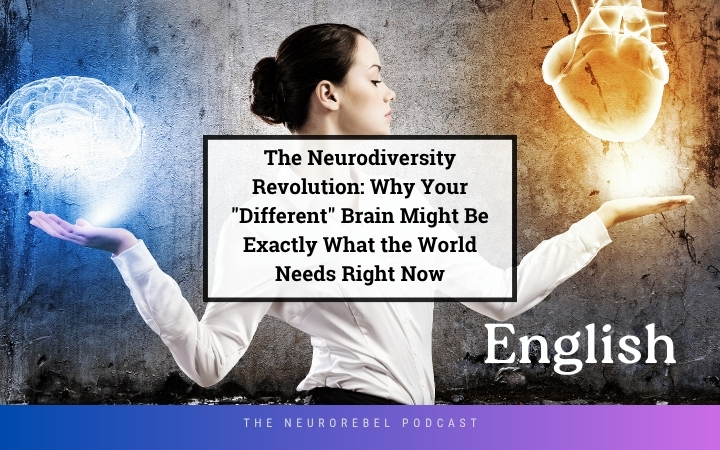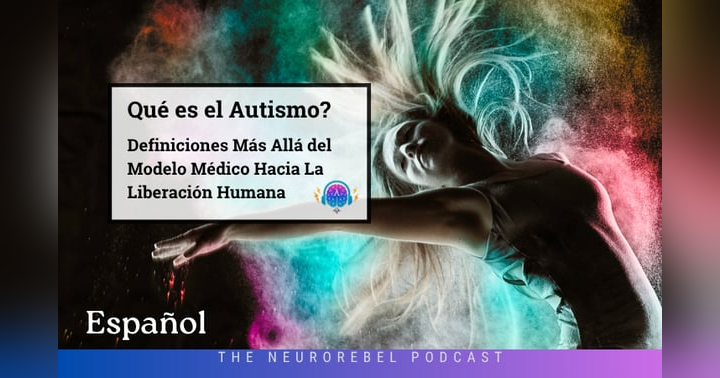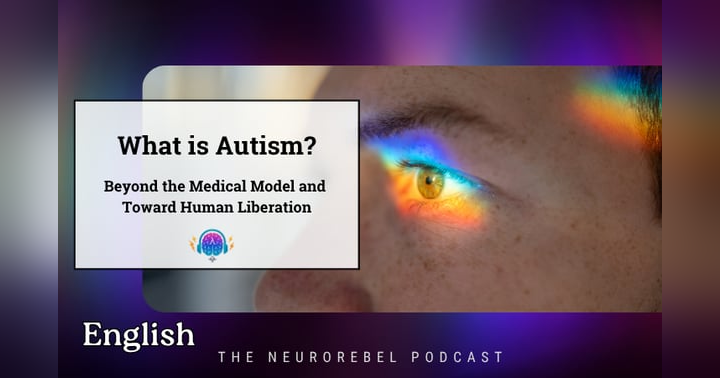The Neurodiversity Revolution: Why Your "Different" Brain Might Be Exactly What the World Needs Right Now

The Mind-Blowing Truth About How Your Brain Works
Picture this: You're sitting in a coffee shop, watching people navigate their daily routines. That person methodically organizing their desk might have autism. The entrepreneur sketching revolutionary ideas on napkins could have ADHD. The programmer solving complex algorithms in their head might be dyslexic.
Here's the kicker: They're not succeeding despite their neurological differences—they're succeeding because of them.
Welcome to the neurodiversity revolution, where "different" isn't a defect—it's a design feature.
What Is Neurodiversity? (And Why It's Not What You Think)
Forget everything you think you know about "normal" brains. Neurodiversity isn't a trendy buzzword—it's a biological reality that's been hiding in plain sight.
The Science: 15% to 20% of the population is considered to be neurodiverse, encompassing conditions like autism, ADHD, dyslexia, dyscalculia, and Tourette's syndrome. That's roughly 1.2 billion people worldwide whose brains are wired differently.
Think of it like this: If biodiversity makes ecosystems stronger, neurodiversity makes human society more innovative, creative, and resilient.
Breaking Down the Terminology (Because Words Matter)
-
Neurodivergent: Your brain operates outside the statistical "norm"—and that's actually pretty awesome
-
Neurotypical: Your brain follows more conventional patterns (but honestly, is any brain truly "typical"?)
-
The Neurodiversity Paradigm: The revolutionary idea that neurological differences are natural variations, not medical problems to fix
The Underground Movement That Started It All
This isn't some corporate diversity initiative dreamed up in a boardroom. The neurodiversity movement is a social justice movement that seeks civil rights, equality, respect and inclusion for all neurodivergent people, and it started with autistic self-advocates who were tired of being told how they should exist in the world.
In the early days of the internet, people socialized over listservs and IRCs, creating communities where autistic voices could finally be heard without being filtered through medical professionals or worried parents. The motto that emerged was powerful: "Nothing About Us Without Us," meaning autistic people needed to be involved whenever autism was discussed.
The Four Pillars of the Neurodiversity Movement
-
Acceptance Over "Fixing": Stop trying to make neurodivergent people "normal"—start making society accessible
-
Depathologization: These aren't disorders to cure, they're natural human variations
-
Challenging the Medical Model: The problem isn't the person, it's the environment that can't accommodate them
-
Neuroaffirmative Support: Build on strengths, don't just manage weaknesses
The Corporate World Is Waking Up (And Getting Rich Doing It)
Here's where it gets interesting for your career: Research suggests that teams with neurodivergent professionals in some roles can be 30% more productive than those without them.
Companies like Microsoft, SAP, and Goldman Sachs aren't hiring neurodivergent people out of charity—they're doing it because it's brilliant business. The share of US job postings mentioning neurodiversity-related keywords has nearly tripled over the past half dozen years, rising from roughly 0.5% of all postings as of January 2018 to 1.3% by December 2024.
Why Neurodivergent Employees Are Secret Weapons
-
Pattern Recognition: Many autistic people can spot patterns that others miss entirely
-
Hyperfocus: ADHD brains can achieve incredible depth of concentration when engaged
-
Creative Problem-Solving: Dyslexic thinkers often approach challenges from completely unexpected angles
-
Attention to Detail: Some neurodivergent people catch errors that entire teams miss
The Social Media Revolution Nobody Saw Coming
Much of autism awareness and campaigning was driven by social media, including the notable growth of TikTok and the emergence of autistic advocates who are changing the narrative one post at a time.
For the first time in history, neurodivergent people can share their experiences directly, without medical professionals interpreting their voices. They're creating communities, building support networks, and educating the world about what neurodiversity actually looks like from the inside.
The Double-Edged Sword of Online Communities
While social media has democratized neurodiversity advocacy, it's also created new challenges:
-
Self-diagnosis trends (which can be both empowering and problematic)
-
Information overload
-
The need for better accessibility features (hello, automatic captions!)
The Uncomfortable Truths We Need to Face
The Stigma Is Real (But It's Changing)
Despite growing awareness, neurodivergent people still face three types of stigma:
-
Public Stigma: Outright discrimination and social rejection
-
Self-Stigma: Internalized shame and self-doubt
-
Stigma by Association: Family members facing judgment
The research reveals a fascinating finding: when people share their neurodivergent diagnosis, understanding increases and stigma decreases. Information is power.
The "Neurodiversity-Lite" Problem
There's a watered-down version of neurodiversity making the rounds—one that celebrates differences without addressing systemic discrimination. This "feel-good" version benefits only the most privileged neurodivergent people while leaving behind those who need the most support.
The Debates That Keep Everyone Up at Night
Is Neurodivergence a Disability?
This question divides even the neurodivergent community. Some argue that their differences only become "disabling" when society fails to accommodate them. Others experience genuine challenges that can't be solved by changing the environment alone.
The answer? It's personal. Some neurodivergent people identify as disabled, others don't, and both perspectives are valid.
The Biology vs. Social Construction Debate
Critics argue that without clear biological markers, conditions like autism are "social constructions." Advocates counter that lived experience and functional differences are real, regardless of what brain scans show.
What This Means for You (Yes, You)
If You're Neurodivergent:
-
Your brain isn't broken—it's different
-
You belong in conversations about your own experience
-
Your unique perspective has value
-
You deserve accommodations, not just tolerance
If You're Neurotypical:
-
Listen to neurodivergent voices directly
-
Question assumptions about "normal"
-
Advocate for accessible environments
-
Recognize that neurodiversity benefits everyone
If You're an Employer:
-
By creating a supportive workplace for neurodiverse individuals, firms inadvertently improve the workplace experience for their workforce as a whole
-
Organizations are increasingly adopting strategies based on human-centered approaches, including a neuro-inclusive approach
-
The talent pool you're missing is massive and underutilized
The Future Is Neurodiverse
We're witnessing a fundamental shift in how humanity understands itself. The neurodiversity movement isn't just about accommodating differences—it's about recognizing that those differences are often advantages in disguise.
In a world that increasingly values innovation, creativity, and out-of-the-box thinking, neurodivergent minds aren't just welcome at the table—they're essential.
From Blog to Podcast: Dive Deeper with The NeuroRebel
This blog post marks the beginning of our in-depth exploration of the neurodiversity paradigm. If these ideas have sparked something in you—whether it's recognition, curiosity, or that electric feeling of finally seeing yourself reflected in the conversation—then you're ready for the full experience.
This post accompanies our latest episode of The NeuroRebel Podcast, where we unpack the neurodiversity paradigm with the nuance, humor, and raw honesty it deserves. We go beyond the surface-level "inspiration porn" to explore what it really means to be a neurological rebel in a world built for conformity.
In the episode, you'll hear:
-
Personal stories from neurodivergent individuals who've transformed their "deficits" into superpowers
-
Candid conversations with researchers challenging the medical model
-
Practical strategies for creating truly inclusive environments
-
The uncomfortable truths about privilege within the neurodiversity movement itself
Because sometimes, the most important conversations happen when we stop performing neurotypicality and start embracing our authentic, beautifully chaotic selves.
Your Turn: Join the Conversation
The neurodiversity revolution isn't happening to you—it's happening with you. Whether you're neurodivergent, neurotypical, or somewhere in between (because honestly, we all are), your voice matters in this conversation.
Share your story: What has neurodiversity meant in your life? How has it shaped your perspective, your work, and your relationships?
Challenge assumptions: The next time you hear someone described as "high-functioning" or "low-functioning," ask yourself: functioning for what? According to whom?
Advocate for change: Push for accessible environments, inclusive hiring practices, and educational approaches that recognize different learning styles.
The future isn't about fixing people to fit the world—it's about creating a world that fits all kinds of minds.
Ready to Rebel? Join The NeuroRebel Community
Listen to the full episode of The NeuroRebel Podcast wherever you get your podcasts—Apple Podcasts, Spotify, Google Podcasts, or your favorite podcast app. Search for "NeuroRebel Podcast" and hit that subscribe button so you never miss an episode.
But here's where the real magic happens: Join our community of neurological rebels. Share your story in the comments below, tag us on social media with #NeuroRebel, or slide into our DMs. Tell us:
-
What moment made you realize your brain works differently?
-
How has understanding neurodiversity changed your life?
-
What would you want neurotypical people to know?
-
How are you rebelling against neurotypical expectations?
Because here's the truth: The most revolutionary act is showing up as your authentic, unmasked self. And when we do that together, we don't just change minds—we change the world.
Your neurodiversity story matters. Your voice belongs in this conversation. And your brain, exactly as it is, is exactly what this world needs.
HELPFUL INFOGRAPHIC ON THE HISTORY OF THE NEURODIVERSITY PARADIGM
#NeuroRebelPodcast #Neurodiversity #AutismAcceptance #ADHD #Dyslexia #Inclusion #NeurodiversityParadigm #WorkplaceInclusion #MentalHealth #Neurodivergent #SocialJustice #NeuroRebel
🎧 Don't forget: Subscribe to The NeuroRebel Podcast and join thousands of listeners who are reshaping the conversation about what it means to be beautifully, brilliantly different.







